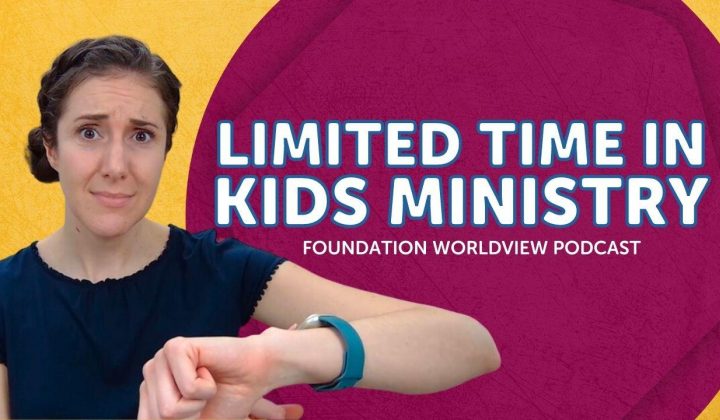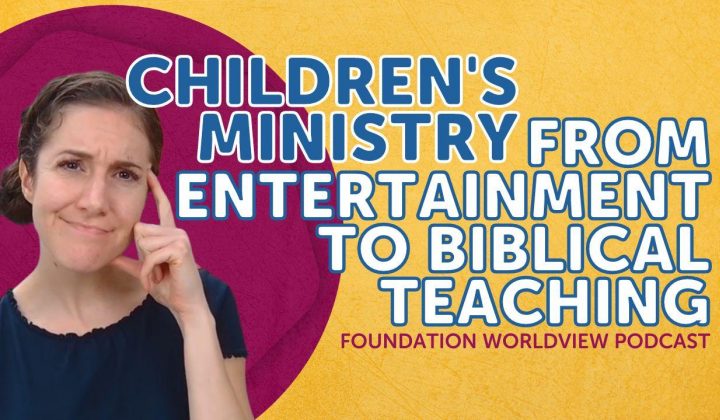Learn more about the journey that led to us equipping kids to carefully evaluate every idea they encounter.
Meet members of our team who have contributed to curriculum development.
Hear from real users of the Foundation Curriculum.
Learn what we believe about God, Jesus, Scripture, and more.
Aiming High: Navigating Varying Levels of Biblical Literacy in Kids' Ministry
In this episode of the Foundation Worldview Podcast, host Elizabeth Urbanowicz tackles how to handle a diverse range of biblical literacy levels in kids' ministry. She discusses the importance of parents as primary disciple-makers and offers practical strategies for supporting both children with strong biblical literacy and those with little to none. Don't miss this episode that equips teachers and volunteers in children's ministry to effectively reach the goal of making disciples.
Transcript
Note: The following is an auto-transcript of the podcast recording.
Hello friends, and welcome to another episode of the Foundation Worldview Podcast where we seek to answer your questions so that you can equip the children that God has placed in your care to carefully evaluate every idea they encounter and understand the truth of the biblical worldview. I'm your host, Elizabeth Urbanowicz and I'm thrilled that you've joined me for another episode today. Today's question says, "What should we do in kids' ministry when half of the children have almost zero biblical literacy and the other half come from homes where their parents faithfully disciple them each week?" That's a really good question, and as a teacher, I know that it is so difficult when you have children in your classroom who are coming from vastly different backgrounds. That's so challenging to know how to approach that.
Now, as we approach this question of what do we do when a number of kids in our kids' ministry come in with zero biblical literacy and then the other half are actually faithfully discipled by their parents, so they have really solid biblical literacy? I'm going to ask the question that I ask in many Foundation Worldview podcasts is, "what's the goal?" As you think of the time that you are spending with the children in the kids' ministry at your church, what is the goal of that time? Now, I would hope that for anybody who's working in children's ministry, they would answer this question by saying discipleship. The goal is to make disciples of the next generation.
Now, when we think about this, when we think about this goal of discipleship, we know that our command as the church as believers, is to go and make disciples of all nations. Those were the marching orders that Jesus gave us right before he ascended back into heaven. And so we are to go and make disciples. Now, when we look at children, we know that God has a heart for children. We saw Jesus's heart for children in the gospels, and we also see that God has set up the family structure in a certain way. And the way that God has set up the family structure is that effective discipleship should begin, as this person suggested in their question, at home. That effective discipleship of children cannot primarily be done during the church service, during the time of corporate worship every Sunday.
And if we are thinking that this is our goal, that this is going to be the primary discipleship time, we need to completely shift our mindset. Actually at Foundation Worldview, we are big proponents of keeping kids in the corporate worship service with their families. I would highly recommend that you check out a webinar that we did recently called Three Reasons to Stop Sending Your Children to Kids' Ministry. And in that we just build a systematic argument for why it is most biblical and it's wisest for us to keep the children in our church in during corporate worship.
The first thing that I would recommend to anybody working in children's ministry that really has a heart for children and wants to know how to best reach children is that your church needs to, sorry. Your church needs to develop a strong philosophy of parents being the primary disciple makers and the church body coming along to support them in that process of disciple making. Okay, that that needs to be primary, that your church needs to have a switch in its philosophy.
And so some of the best ways to do this are to actually have the pastor go through a sermon series on what biblical discipleship looks like and why its parents' primary responsibility to be the disciple makers of their children, and to also include single people or empty nesters or widows or widowers in on this conversation, that they're a valuable part of the body of Christ to come alongside parents as parents are seeking to make disciples of their children. And once your church has this philosophy, then the structure of any class time with children needs to be structured according to that philosophy. And so according to that philosophy, the goal of a time together on a Sunday morning or a Sunday evening or a Wednesday evening, would be to supplement what the parents are already doing at home.
And in this, what we want to do is we want to aim high. A lot of times what churches or even sometimes what educators do in the classroom is they say, "oh, well, you know what? Some of the kids are down here, so we're going to aim down low to make sure that everybody gets this." Well, when you aim down low, what happens is you completely waste the time of everybody who already understands that concept. And for the students that are at that low level, you don't give them anything to shoot for, you don't give them anything to reach towards and to grow towards.
I remember when I started taking Spanish for the first time in seventh grade, my Spanish teacher, she told us on the first day of school that she knew we didn't know a lot of Spanish, but that she was going to begin speaking to us only in Spanish on the second day of school, and that she was going to do hand gestures and other things to help us understand. However, she was strictly going to be speaking Spanish. And she said, there's a reason for this. And what she did is she held up her hand and she held it up just right above her head, and she said, if I aim this high, and her hand was above her head, she's like, you are probably going to land about this high. And then she held her arm right above her shoulder where she said, if I aim for this high, and she held her hand right near her shoulder, she said, you're probably only going to make it this far. And then she brought her hand down and held it next to her waist. And what she was doing was she was demonstrating for us that wherever she aimed for, we were probably going to be a little bit lower than where she aimed for, but the higher she aimed, the higher we would end up.
It's similar when we're thinking about biblical literacy, developing biblical literacy in the children who has placed in our care within the church, that if we are aiming, if we're just thinking, oh, you know what, these children, they don't have any biblical literacy, and we reach down to where they are, one, the children who do have good biblical literacy because their parents are doing what they should be doing at home, they're going to think that church, that the time we come together as the body of Christ is something that is dumb, it's watered down, and is anti-intellectual because they're used to doing so many more difficult activities at school, whether it's in a public school, in a Christian school or in a homeschool. They're used to doing so many more difficult activities. And so they're just going to think, oh, at church, you turn off your mind.
Or the children who do not have any biblical literacy, if we're just dumbing things down for them, they're just going to think the same thing. Okay, this is easier than school. I don't really need to pay attention to this. Or if we're aiming high, if we're assuming that the children are coming in with biblical literacy and we're aiming high, we're going to help those children who already have good biblical literacy because of what their parents are doing at home, and we're actually going to be then supporting those parents who are doing their job well. And for the children who come in without any biblical literacy, they're going to realize that they're missing something important. And one, they're going to hopefully work harder to understand what is going on, and they're going to be communicating at home like, Hey, mom and dad, something is wrong. I don't get what's going on in this class. And so this is actually going to help reveal when parents are not doing their job well, but it will be giving these parents and the children something to aim for rather than giving them a false belief that the Christian life is a life of dumbed down intelligence. And so we want to aim high.
Now also, just want to reiterate that the corporate worship hour, the corporate worship hour, our children really should be involved in it. And also, one of the other things we tend to get wrong when we think about corporate worship is we tend to think that our corporate worship time is a time on Sunday for outreach, that it's a time when we can bring our friends to church and the pastor can share the gospel with him if that's the mindset that we have. My question would be where do we see that modeled in Scripture? Where do we see modeled for us that when believers got together to celebrate on the day that that was the time for them to bring in non-believers and introduce them to the believing community? That was the primary time for sharing the gospel. Nowhere we don't see that anywhere in Scripture. That might be the American seeker sensitive model, but that is not the biblical model.
What we see modeled in Scripture is that the body of Christ would come together for corporate worship on the Lord's day on a Sunday morning as a time of celebrating Jesus's resurrection, as a time of sharing in the Lord's Supper, as a time of sitting underneath the preaching of God's word, and singing hymns of Thanksgiving to God. That Sunday, the Lord's Day, is a time of the body being built up. And then what we see in the New Testament is then once the body is built up, built up through corporate worship together, then those individuals within the body of Christ as they're living their normal Christian lives out in the world, that is where they share the gospel.
So we need to stop viewing Sunday morning as a time of outreach. Yes, outreach should be done, we should be sharing the gospel, and we should be sharing it with children in our community. But the goal is not to get the children and the adults within the walls of the church building, but it is to get the church, the body of Christ out in the community, sharing the gospel. And you know what? When we build up the body as it should be built up through corporate worship and daily life together throughout the week, way more outreach, way more gospel outreach is going to be taking place because then the church is going to be healthy. And so we need to put our focus, if we're in church leadership, we need to put our focus on how can we as church leaders build up the body so then the body can do its job of living as the body and going out and preaching the gospel.
Now, this story is not an exact parallel, but I think it's a helpful example, that my first few years of teaching, I was exhausted like many first year teachers are. But one of the reasons I was exhausted is I was doing everything myself. I had never trained my students in any classroom responsibilities that they were to do to actually help the classroom function well. And I just thought, you know what? They're not really equipped. And every time I've given them a job, they haven't really done it well. So you know what? I'm just going to do it myself. Well, you know what happened? I became exhausted. I became rundown. I became tired. I wasn't able to do my teaching job as well as I was supposed to because I was running around the classroom all day during the school day and after school trying to clean things up and get things organized in the way that they should be. And my students, they just had a really laissez-faire attitude of like, "nah, I come to school, I do what I'm supposed to do. And that's it." Where somebody called me out on my mistake several years into my teaching experience and showed me that I really needed to train my students to do certain jobs well so that they realize that they were a vital and necessary component member of our classroom body, and that then I could be equipped to do what God had called me to do.
And so several years into my teaching experience, I started intentionally training my students in different jobs, and I would train them and we would practice day after day after day after day until they got it down. And then once they got it down, I would send them off to do that job every single day. And if I saw issues, I'd pull 'em in for recess and say, "okay, we're having issues with you cleaning the desk properly after school, or with you organizing the papers or with you putting the computers away," whatever it was. And then I would retrain them, we'd talk through it, and they would then show me that they knew how to do it well, and then our classroom functioned well that I could perform my job well, they knew they were a vital member of our classroom community, and the classroom just ran so much more smoothly.
And it's the same with the church. That church leaders' jobs are to shepherd the body, are to help the church members grow in their knowledge of Scripture and in godliness so that then those church members, the body of Christ, could actually be equipped to go and live as the body both within the church and then in the community.
And so I would highly encourage you, if you're in this situation with the church that God has placed you in, make sure that your church is developing a strong biblical philosophy of parents being the primary disciple makers of their children. Then if you're still having children's ministry classes, aim high, aim high for the children who already have solid biblical literacy so that you're helping come alongside those parents, you're actually supporting the church's biblical philosophy of family discipleship. And for those children who are not being discipled well at home, that you're giving them something to aim for, and you're helping reveal for those parents that they're not making discipleship as a priority as they should.
Well, that's a wrap for this episode. But as always, my prayer for you as we leave this time together is that no matter the situation in which you and the children, God is placed in your care, find yourselves, that you would trust that God is working all things together for your good by using all things to conform you more into the image of His Son. I'll see you next time.
Related Posts and insights

Limited Time in Kids Ministry
Today's question asks, "our kids' ministry only has one hour each week for a lesson. Do you have any ideas on how we can present truth in a quick way?"

Children's Ministry: From Entertainment to Biblical Teaching
Does the children's ministry at your church feel superficial and entertainment-based? If you want to make a change, then this episode is for you! Join Elizabeth Urbanowicz as she explores how to transform your church's Sunday school program by incorporating sound biblical teaching.

Why Orange Curriculum is Bad
In this eye-opening podcast episode, Elizabeth Urbanowicz analyzes the effectiveness of the popular Orange Curriculum and discusses the pitfalls of proof-texting moral lessons. We'll even look at scripture-based alternatives to Orange Curriculum. Don't miss this essential conversation on transforming kids' ministry for the better!





